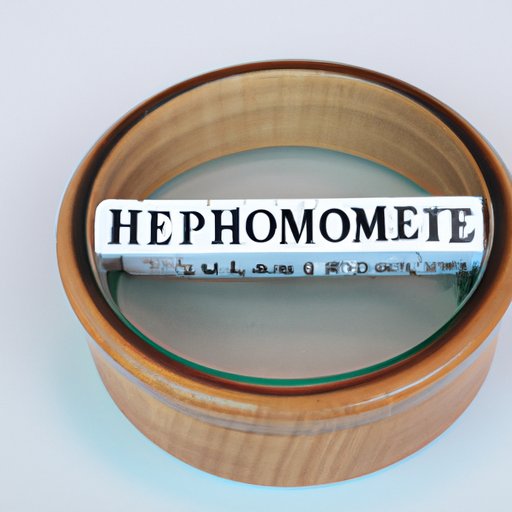
I. Introduction
Hemorrhoids are a common, but often painful condition that can affect anyone at any age. They occur when the veins around the anus and rectum become swollen and inflamed. Hemorrhoids can be caused by a number of factors, including pregnancy, straining during bowel movements, and a low-fiber diet.
While they can be embarrassing to discuss, it is important to seek treatment for hemorrhoids to reduce discomfort and prevent complications. This article will explore the different options for hemorrhoid treatment, including natural remedies, medical treatments, and lifestyle adjustments.
II. Natural Remedies for Hemorrhoid Relief
If you are experiencing mild hemorrhoid symptoms, there are several natural remedies that you can try before resorting to medical treatment.
Sitz baths, which involve soaking the affected area in warm water for 10-15 minutes, can help reduce pain and swelling. Cold compresses, such as ice packs or frozen vegetables wrapped in a towel, can also provide relief.
Staying hydrated and eating fiber-rich foods, such as fruits, vegetables, and whole grains can help soften stool and reduce constipation, which can aggravate hemorrhoids.
Many people have found relief from hemorrhoid symptoms by trying these natural remedies.
III. Over-the-Counter Remedies for Hemorrhoids
If natural remedies do not provide adequate relief, over-the-counter creams, ointments, and suppositories may be effective.
These topical treatments work by numbing the affected area or reducing inflammation. Some products also contain astringents, which help shrink hemorrhoids.
If you choose to use over-the-counter remedies, be sure to follow the instructions carefully and avoid using them for longer than recommended. Overuse of these products can lead to further irritation and discomfort.
IV. Lifestyle Changes to Prevent Hemorrhoids
Making certain lifestyle changes can help reduce your risk of hemorrhoid flare-ups.
Regular exercise, such as brisk walking or jogging, can help prevent constipation and promote healthy bowel movements. Avoid sitting for prolonged periods, as this can put pressure on the veins around the anus and rectum. If you have a desk job or spend a lot of time sitting, try to take frequent breaks to stand and move around.
Practicing good bathroom habits can also help prevent hemorrhoids. Avoid straining during bowel movements, and do not sit on the toilet for longer than necessary. Use moistened wipes or a bidet to clean the area, and avoid harsh or scented soaps.
Many people have found relief from hemorrhoid symptoms by making these lifestyle adjustments.
V. Medical Options for Hemorrhoid Treatment
If natural remedies, over-the-counter remedies, and lifestyle changes do not provide adequate relief, medical treatments may be necessary.
Banding involves placing a rubber band around the base of the hemorrhoid, which cuts off its blood supply and causes it to shrink and fall off within a few days.
Sclerotherapy involves injecting a chemical solution into the hemorrhoid, which also causes it to shrink.
Surgery may be necessary in severe cases, but is usually reserved for those with large, protruding hemorrhoids or those who have not responded to other treatments.
Many people have found relief from hemorrhoid symptoms by undergoing these medical treatments.
VI. Natural Supplements to Treat Hemorrhoids
Herbal supplements can also be effective in treating hemorrhoids.
Horse chestnut contains a substance called aescin, which is thought to strengthen veins and improve circulation. Bilberry, which contains compounds called anthocyanins, may also help strengthen veins and reduce inflammation. Butcher’s broom contains compounds called ruscogenins, which may be effective in reducing swelling and improving blood flow.
If you choose to use natural supplements, be sure to consult with your doctor first. Some supplements can interact with medications you are already taking or may be unsafe for certain people.
VII. Do’s and Don’ts for Hemorrhoids
If you are suffering from hemorrhoids, there are certain things you should and should not do.
Do keep the area clean and dry, and use a donut cushion or inflatable pillow to sit on. This can help reduce pressure on the affected area.
Do try natural remedies, over-the-counter remedies, and lifestyle adjustments before resorting to medical treatment.
Do seek medical attention if your symptoms are severe or do not respond to other treatments.
Don’t strain during bowel movements, as this can aggravate hemorrhoids.
Don’t sit on the toilet for longer than necessary, as this can increase pressure on the veins around the anus and rectum.
Don’t eat spicy foods, which can irritate hemorrhoids.
VIII. Conclusion
Hemorrhoids can be an uncomfortable and sometimes embarrassing condition, but there are many options for effective treatment.
If you are experiencing hemorrhoid symptoms, try natural remedies, over-the-counter remedies, and lifestyle adjustments before seeking medical treatment. If your symptoms are severe or do not respond to other treatments, consult with your doctor about medical options.
Whether you choose natural remedies or medical treatment, it is important to take steps to reduce your risk of hemorrhoid flare-ups by adopting healthy habits and practicing good bathroom hygiene.
Disclaimer: The information in this article is intended for informational purposes only and should not be considered medical advice. Always consult with your doctor before starting any new treatment or supplement.





